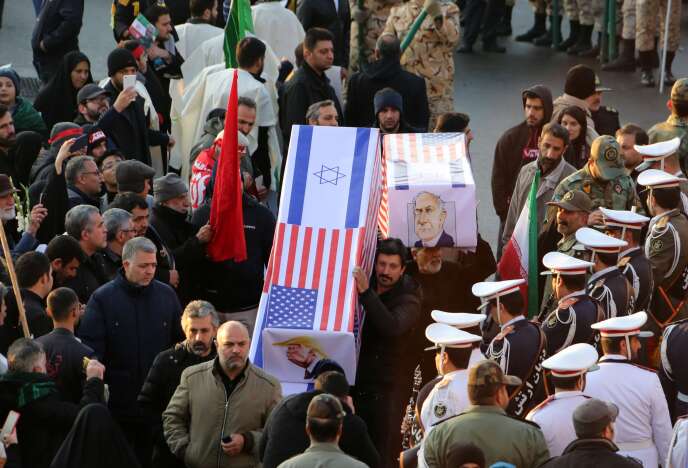
Three days after the assassination of the architect of regional Iranian politics Gen. Qassem Soleimani by the United States on Friday Jan. 3 in Baghdad, tensions are rising in the Middle East on multiple levels. The one-upmanship being played out between Tehran and Washington — and beyond that, from Baghdad to Beirut — has already produced a particularly harmful effect: that of strengthening the hardliners across all camps.
In Iran, the amplitude of the demonstrations on Sunday that marked Gen. Qassem Soleimani’s funeral inevitably translates to a reinforcement of the regime, which, however, recently had to respond to a practically unprecedented wave of popular protest with ferocious suppression. On Sunday evening, the Iranian power declared, as could be expected, that it was freeing itself from the restriction on uranium enrichment imposed by the multilateral Nuclear Deal Framework finalized in 2015; a treaty that President Trump denounced in 2018.
The Iranian Foreign Minister Javad Zarif has taken care to maintain minimal room for diplomatic maneuvers, but the moderate voice he was supposed to represent in the regime with President Rohani, is no longer valid. Now it’s time for warlike rhetoric: Iran’s response will “for sure be military and against military sites” in the United States, promised the military adviser of the revolution’s leader.
Echoing these threats, the head of Hezbollah, Hassan Nasrallah, a powerful regional ally of the Islamic Republic, on Sunday promised “a just punishment” targeting “American military presence in the region.”
Free Rein for the Organization of the Islamic State
At the heart of the turmoil, Iraq — torn between Tehran and Washington and already shaken before the events of the past few days by political crisis and a widespread popular protest movement — seems to have chosen: On Sunday, Baghdad’s parliament asked for American troops to leave. The decision is now in the hands of the Iraqi executive.
In Washington, Trumpian rhetoric seems to know no bounds. Criticized for threatening to attack — among the 52 targets selected in the event of a new escalation are cultural sites important to Iranians — the American president went back on this threat. .. to reinforce it. The United States’ response, he insisted, will be “disproportionate.” Trump was applauded by Israeli Prime Minister Benjamin Netanyahu, who has made Iran his enemy number one. The president has also threatened Baghdad with “sanctions like they’ve never seen before, ever,” if Iraq ousts U.S. forces from its territory.
These U.S. forces, with some 6,000 troops, were deployed to Iraq as part of the international coalition led by the United States’ struggle against Islamic State. Announced on Sunday, the American order was that this fight was suspended in order to allow the American troops to focus on their own protection. Again, this decision has potentially very serious consequences: that of giving free rein to IS, which is already gaining strength in Syria and Iraq along the Euphrates valley.
This is one of the main concerns for Europe, which can see not only the semi-quashed chance of saving the Iranian nuclear deal, but which must also come face to face with the prospect of an IS resurgence. Their attempts at de-escalation will be welcome, if they can be heard.

Leave a Reply
You must be logged in to post a comment.